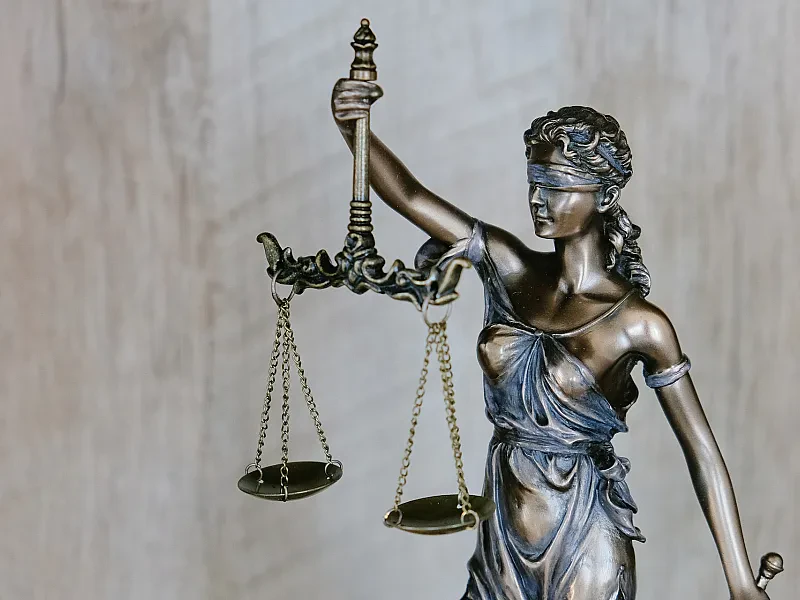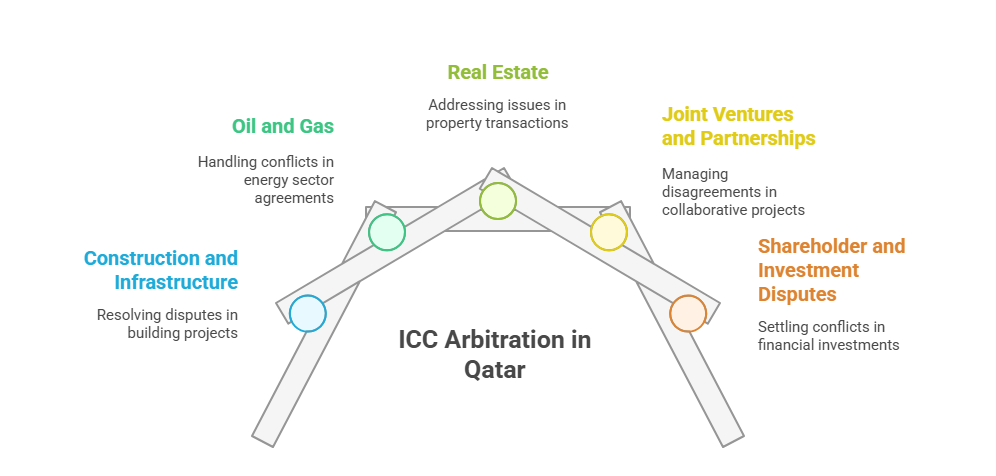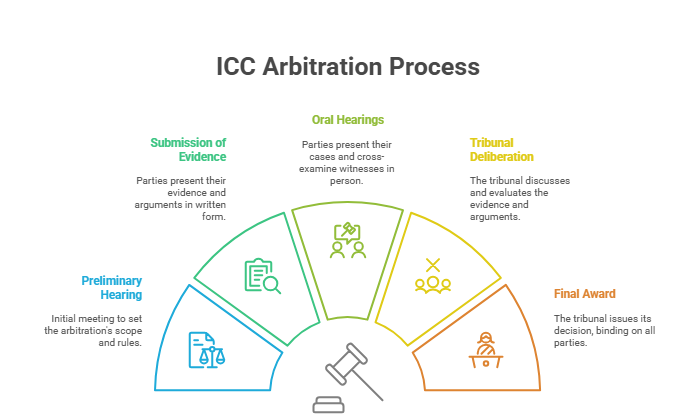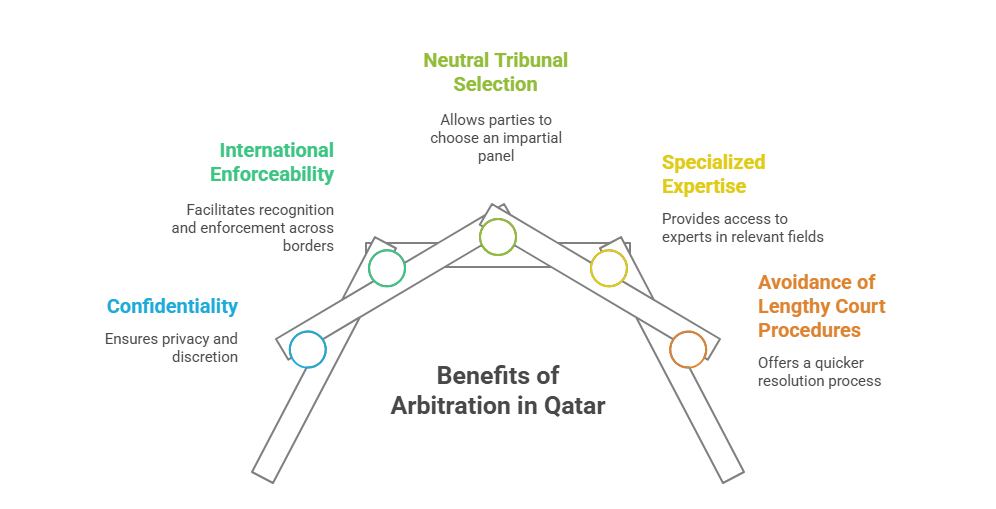
Table of Contents
Understanding ICC Arbitration in Qatar
As Qatar continues to attract international investment and cross-border business activity, disputes are inevitable. One of the most preferred methods of resolving such disputes is ICC Arbitration, governed by the International Chamber of Commerce (ICC). This form of arbitration is internationally recognized and highly respected for its enforceability, neutrality, and efficiency.
What Is ICC Arbitration?
ICC arbitration is a private and legally binding form of dispute resolution, conducted under the rules of the International Chamber of Commerce. It offers an alternative to court litigation and is particularly favored for international commercial agreements.
In Qatar, ICC arbitration is widely used in sectors such as:

ICC Arbitration Rules Applicable in Qatar
The 2021 ICC Arbitration Rules apply globally, including in Qatar. These rules govern:
- Appointment of arbitrators
- Hearings and evidence
- Confidentiality
- Emergency arbitrator procedures
- Awards and enforcement
Drafting ICC Arbitration Clauses in Commercial Contracts
To use ICC arbitration, parties must include an arbitration clause in their contract. A typical clause reads:
"All disputes arising out of or in connection with the present contract shall be finally settled under the Rules of Arbitration of the International Chamber of Commerce by one or more arbitrators appointed in accordance with the said Rules."
Careful drafting ensures enforceability in Qatari courts.
Why You Need an ICC Arbitration Lawyer
When to Hire a Lawyer for Arbitration
You should hire an ICC arbitration lawyer in Qatar when:
- A dispute under an ICC clause arises
- You need to file or respond to a claim
- You are preparing documentation for arbitration proceedings
- You need to enforce or annul an arbitral award
Qualities of a Good ICC Arbitration Attorney in Qatar
Look for lawyers who:
- Are licensed to practice in Qatar
- Have experience in international commercial law
- Are bilingual (Arabic and English)
- Are familiar with Qatari and ICC procedural law
- Can handle document-heavy, high-value disputes
Top Law Firms Handling ICC Arbitration Cases
Some of the leading law firms in Qatar specializing in ICC arbitration include:
- Al Tamimi & Company
- Sultan Al-Abdulla & Partners
- Clyde & Co Doha
- Dentons Qatar
- Simmons & Simmons Middle East LLP
These firms offer full arbitration support—from case assessment and negotiation to enforcement of awards.
Sectors Commonly Using ICC Arbitration in Qatar
Construction and Infrastructure Disputes
Due to complex contracts and large financial stakes, the construction industry frequently relies on ICC arbitration. Claims may involve delays, cost overruns, and defective work.
Oil, Gas, and Energy Sector Conflicts
Qatar’s hydrocarbons sector often includes international joint ventures. Disputes over production sharing agreements, exploration licenses, and supply contracts are often resolved through ICC arbitration.
Shareholder and Corporate Disputes
In closely-held companies and joint ventures, disputes may arise over profit sharing, management decisions, or exit terms. These are sensitive cases best resolved privately via arbitration.
Banking and Financial Services Arbitration
Disputes involving syndicated loans, financial derivatives, or commercial guarantees are suitable for arbitration, especially when multiple jurisdictions are involved.
Real Estate and Joint Venture Disputes
Partnerships between local and foreign entities in real estate often include ICC clauses to prevent local court jurisdiction. ICC arbitration offers neutrality and confidentiality.
Legal Process of ICC Arbitration in Qatar
Filing an ICC Arbitration Case in Qatar
- Submit a Request for Arbitration to the ICC Secretariat
- Pay the filing fee based on the claim amount
- Appoint arbitrators or rely on ICC to do so
- Respondent files an Answer to the Request
- Tribunal is formed; proceedings begin
Key Stages in the ICC Arbitration Process

The process may take 12 to 18 months, though expedited procedures are available for claims under USD 3 million.
Documentation and Procedural Requirements
Essential documents:
- Commercial contract
- Arbitration clause
- Supporting evidence (emails, invoices, expert reports)
- Written submissions (Statements of Claim and Defense)
- Witness statements or expert reports
Enforcing ICC Arbitration Awards in Qatar
Enforcement Mechanism under Qatari Law
Qatar is a party to the New York Convention (1958), meaning it must recognize and enforce valid foreign arbitral awards. ICC awards are enforceable if:
- The agreement is valid
- Due process was followed
- The award is not against Qatari public policy
Role of Qatar Courts in Arbitration Awards
Qatari civil courts do not re-litigate the case. They review only for procedural compliance. The enforcement request is filed with the First Instance Civil Court.
Recognition of Foreign ICC Awards
Foreign ICC awards are enforced in the same manner as local ones, thanks to the New York Convention. This gives ICC arbitration international reliability.
Appeals, Annulments, and Legal Challenges
Qatar allows limited grounds to annul arbitration awards:
- Invalid arbitration agreement
- Irregular composition of tribunal
- Party was not given proper notice
- Award violates public policy
Annulment must be filed within 90 days of award notification.
Arbitration vs Litigation in Qatar
Why Businesses Prefer Arbitration Over Litigation
Advantages of arbitration include:

Pros and Cons of Each Method
| Arbitration | Litigation |
|---|---|
| Private and confidential | Public court record |
| Flexible procedures | Fixed procedural rules |
| Enforceable internationally | Domestic enforcement only |
| Expensive upfront costs | Lower initial court fees |
| Limited right of appeal | Full appellate system |
Cost, Speed, and Enforceability
While arbitration may cost more initially, it is generally faster and provides enforceable outcomes globally—especially valuable for multinational contracts.
Qatar's Arbitration Law and 2025 Updates
Law No. 2 of 2017 and Its Impact
Qatar’s current arbitration framework is based on Law No. 2 of 2017, aligned with UNCITRAL Model Law. It provides:
- Equal treatment of parties
- Independence of arbitrators
- Recognition of electronic communication
2025 Amendments to Arbitration Regulations
Expected reforms in 2025 include:
- Mandatory digitization of arbitration filings
- Reduced timelines for award enforcement
- Stronger protections for party autonomy
- Encouragement of bilingual arbitration (Arabic/English)
How These Affect ICC Arbitration Cases
The reforms aim to make Qatar a regional hub for international arbitration, further strengthening the enforceability of ICC awards and speeding up procedural timelines.
Technology in Arbitration: Virtual Hearings
Conducting ICC Arbitrations Online
The ICC now allows fully virtual proceedings using secure platforms like Zoom or Microsoft Teams. This is especially useful for:
- Cross-border disputes
- Pandemic-related delays
- Cost-saving needs
Benefits and Risks of Remote Arbitration
Pros:
- Lower travel costs
- Greater scheduling flexibility
- Real-time document sharing
Cons:
- Time zone issues
- Security concerns
- Tech failure risk
Acceptability in Qatar Jurisdiction
Qatari courts recognize virtual hearings, provided they are conducted under ICC rules and follow due process. Ensure all proceedings are documented and recorded.
Final Thoughts
Finding the Right Lawyer for ICC Arbitration
Engage a firm that:
- Has an ICC arbitration track record
- Knows local court systems
- Offers multilingual and multi-jurisdictional capability
Ask for case studies or references when choosing counsel.
When to Settle, When to Proceed
Consider early settlement negotiations or mediation to save time and costs. But if enforcement, damages, or legal precedent matter—proceed with arbitration.
Resources for Clients and Legal Teams in Qatar
- ICC International Court of Arbitration: iccwbo.org
- Qatar International Court and Dispute Resolution Centre (QICDRC)
- Ministry of Justice Qatar: moj.gov.qa
- Law firms offering ICC arbitration support
Need ICC arbitration help in Qatar?
Contact a qualified international dispute resolution attorney or arbitration-specialized law firm to handle your case from filing to enforcement.
Disclaimer: This article provides general information and should not be construed as legal advice. Please consult with a qualified and experienced lawyer for personalized guidance regarding your specific situation.
